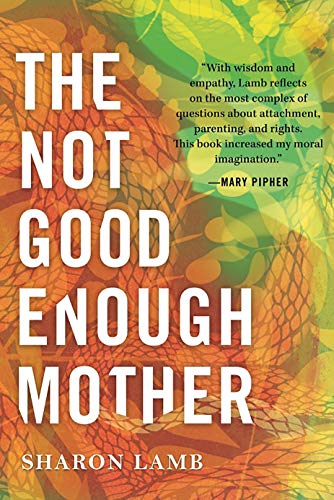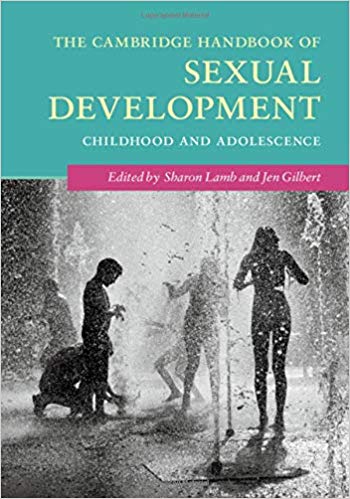Books
This book is for a general trade audience. A psychologist who evaluates the fitness of parents when their children have been removed from their custody finds herself reassessing her own mothering when her son falls victim to the opioid crisis.
Psychologist and expert witness Dr. Sharon Lamb evaluates parents, particularly in high-stakes cases concerning the termination of parental rights. The conclusions she reaches can mean that some children are returned home from foster homes. Others are freed for adoption. Well-trained, Lamb generally can decide what’s in the best interests of the child. But when her son’s struggle with opioid addiction comes to light, she starts to doubt her right to make judgments about other mothers.
As an expert, a professor, and a mother, Lamb gives voice to the near impossible standards demanded by a society prone to blame mothers when anything befalls their children. She describes vividly the plight of individual parents, mothers in particular, struggling with addiction and mental illness and trying to make stable homes for their kids amid the economic and emotional turmoil of their lives—all in the context of the opioid epidemic that has ravaged her home state of Vermont. In her office, during visits with their children, and in the family court, the parents we meet wait anxiously for Lamb’s verdict: Have they turned their lives around under child welfare’s watchful eye? Do they understand their children’s needs? In short, are they good enough? But what is good enough? Lamb turns that question on herself in the midst of her gradual realization of her son’s opioid addiction. Amazed at her own denial, feeling powerless to help him, Lamb confronts the heartache she can bring into the lives of others and her power to tear families apart.
Cambridge Handbook of Sexual Development: Childhood and Adolescence
This book is a carefully curated conversation that brings together the top researchers in child and adolescent sexual development to redefine the issues, conflicts, and debates in the field. The Handbook is organized around three foundational questions: first, what is sexual development? Second, how do we study sexual development? And third, what roles might adults - including the institutions of the media, family, and education - play in the sexual development of children and adolescents? As the first of its kind, this collection integrates work from sociology, psychology, anthropology, history, education, cultural studies, and allied fields.
Girls of Color, Sexuality, and Sex Education
This book takes a close look at how girls of color think, talk, and learn about sex and sexual ethics, how they navigate their developing sexuality through cultural stereotypes about sex and body image, and how they negotiate their sexual learning within a co-ed sex education classroom. While girls of color are often pictured as at risk or engaged in risky behavior, the analyses of focus groups and classroom discussions, show not only girls’ vulnerabilities but strengths as they work to integrate diverse identities, media messages, school policy and history into their understanding of the sexual world they are a part of.
Sex Ed for Caring Schools
While arguments for and against teaching abstinence, the use of contraceptives, and sexual identity are becoming more and more polarized, most people agree that students must learn to navigate an increasingly sexual world. Sex Ed for Caring Schools presents a curriculum that goes beyond the typical health education most students receive today. As part of a critical pedagogy movement that connects education to social justice enterprises, this book and the corresponding online curriculum encourage students to talk, write, and think about the moral and relational issues underlying sex in society today. Addressing the real concerns of today’s teens, this book includes lessons on pornography, prostitution, media objectification, religion, and stereotypes.
Packaging Boyhood
co-authored with Lyn Mikel Brown and Mark Tappan
Player. Jock. Slacker. Competitor. Superhero. Goofball. Boys are besieged by images in the media that encourage slacking over studying; competition over teamwork; power over empower - ment; and being cool over being yourself. From cartoons to video games, boys are bombarded with stereotypes about what it means to be a boy, including messages about violence, risktaking, and perfecting an image of just not caring.
“If you read one book this year about how to be a better parent to your son, then it must bePackaging Boyhood. Unlike other parenting or ‘boys books,’ it reveals that boys do not naturally or biologically like violent images, don’t have to do poorly at school; but rather that a bath of hurtful media images are overtaking them – and that you can help save them, teaching them methods for resisting this gender mediocrity so they can grow into the unique, successful young men they truly wish to become!”- William S. Pollack, Ph.D., author of Real Boys: Rescuing Our Sons from the Myths of Boyhood
Packaging Girlhood
co-authored with Lyn Mikel Brown
From Publishers Weekly
Starred Review. That girls are overwhelmed by images of princesses, demure femininity and pink, pink, pink is no surprise. What is shocking, as Lamb (The Secret Lives of Girls) and Brown (Meeting at the Crossroads) so astutely demonstrate, is the downright bombardment girls receive, coming from all forms of media. Lamb and Brown, both psychologists, came to harsh conclusions after they surveyed girls; sat through hours of Rugrats and Kim Possible television programming; scoured stores such as Hot Topic and Claire's; watched Hilary Duff movies; listened to Eminem and Beyoncé; visited MySpace.com; and read Caldecott books. The idea of "girl power was snapped up by the media," and "what it sells is an image of being empowered," argue the authors. Girls are offered two choices by the marketers: they are "either for the boys or one of the boys." Even rebellion is being packaged, "the resistance, that edginess and irreverence that once gave girls a pathway out of the magic kingdom." The book is incredibly readable and rises above others in the genre by giving parents concrete tools to help battle stereotypes. Lamb and Brown include lists of books and movies with positive role models and talking points to help your daughter recognize how she is being manipulated. The authors aren't trying to deny anyone princesses or pink; they just want girls to be knowledgeable enough to choose what will truly interest them. (Sept.)
APA Task Force Report on the Sexualization of Girls
(co-authored with Zurbriggen, Ward, Tolman, Roberts, & Collins)
Sex, Therapy, and Kids
A great book to read on this matter is Sex Therapy and Kids, by Sharon Lamb. If you are feeling ill equipped, under informed, or worrisome about talking about sex, it is important to know that when we’re silent that we’re not providing assistance and that the teens aren’t getting the adult help they need.
When we are silent in response to sexual material brought up by children and/or teenager, we mimic and reproduce the world the child is exposed to every day, one that excites and confuses him/her and provides them with little guidance or space for processing. As adults, it is important for us to take the lead and teach.
-- Moushumi Goshw (Wilson), MFT at www.goodtherapy.org
Before Forgiving
"...this book is a novel addition to the growing field of the study of forgiveness. It satisfies the editors’ stated goals of setting forgiveness in a broader context than have past individual volumes, and calls attention to feminist and multicultural concerns through interdisciplinary and accessible readings. Although some of the readings are more appropriate for audiences already familiar with the literature and with the forgiveness movement in psychotherapy, the anthology on the whole is useful to anyone with an interest in the metaethical and ethical questions surrounding forgiveness. It was challenging to my undergraduate students and valuable to my own research. I can only hope this inspires more philosophers to approach forgiveness from critical, feminist and multicultural perspectives." Kathryn Norlock in Notre Dame Philosophical Reviews
The Secret Lives of Girls
From Publishers Weekly; Sexual play and acts of aggression are common for girls, according to Lamb, a psychology professor at St. Michael's College, but they are conducted in secrecy and often burden the participants with lifelong guilt. Based on interviews with 122 women and girls from a fairly wide range of socioeconomic and ethnic backgrounds (29 were African-American and 22 Latina), this accessible and engaging study reveals that most girls experience sexual and aggressive feelings that fall outside cultural notions of the "good girl." …Forecast: Parents seeking to understand how to talk to their daughters about sexuality, power or ways to deal with anger will learn much here.
Writing in the tradition of Virginia Woolf and contemporary feminism, Sharon Lamb replaces the image of the 'angel in the house' with the voices of actual girls and women. In this important book, she asks us to listen to girls' anger and sexuality without condemnation; in doing so, she breaks the most persistent taboos of patriarchy. – Carol Gilligan
New Versions of Victims
contribute[s] to the project of moving feminist theory and practice beyond reliance, implicit or explicit, on the abstract dualisms of liberal thinking.- Hypatia
"Written in clear, accessible language...New Versions of Victims offers a critical analysis of popular debates about victimization that will be applicable to both practice and theory."- Adolescence
"Timely contribution to the theorization of rape and helps delineate areas in need of further analysis. [Lamb] also address[es] the issue from radically different perspectives and methodologies...particularly noteworthy." - SIGNS
The Trouble with Blame
For Lamb...the knotty criminal-justice problems of sexual assault, domestic battery and rape do not parse neatly into categories of guilt and innocence, right and wrong, good and evil. Instead she sees those crises as surface echoes of profound social and gender dynamics, as unhappy outcomes to which both parties contribute...[A] brisk, sharply written essay...[Lamb offers] a sophisticated position that takes some time to digest, but in the end it makes an enormous amount of sense. Lamb has written a book that uniquely captures her twin senses of sympathy and rectitude--a combination our prison-happy lawmakers would do well to ponder.
--Paul Reidinger (ABA Journal )
A refreshing and courageous feminist excursion that faces the complex dilemmas which occur when perpetration and victimization are simultaneously examined. (Elana Newman, Feminism & Psychology )
[ Lamb] probes the relationship between victim and perpetrators and argues that contemporary stories of abuse, incest, rape and battering make it harder to ascertain absolute guilt and innocence, forcing a rethink of the concept of blame. (Victim Support Magazine )
Emergence of Morality
(co-edited with Jerome Kagan)
"This is a welcome and immensely provocative book. For those of us who favor ethical theorizing done in close proximity to psychology and anthropology, it provides new and illuminating theory and research relevant to perenniel debates about the origins of moral sense, its psychological organization, and the objectivity and unity of morality...Overall, this book is a gold mine of fascinating material of utmost importance for ethics." -- Owen Flanagan, in Ethics





